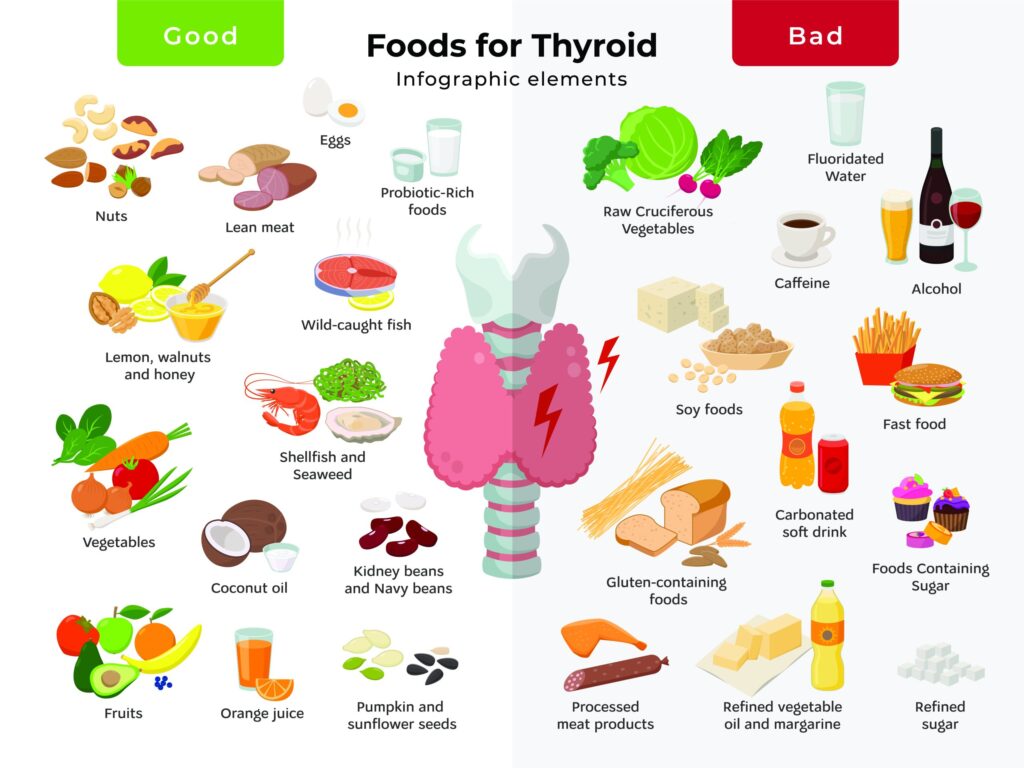Thyroid and Weight Management

Maintaining a healthy weight can sometimes be a complex puzzle, especially when your thyroid is involved. The thyroid, a small gland located in your neck, plays a big role in regulating your metabolism. When your thyroid isn’t working properly, it can significantly impact your weight.
What is the Thyroid?
The thyroid gland produces hormones that regulate your body’s metabolic rate, heart and digestive function, muscle control, brain development, and bone maintenance. Essentially, it influences nearly every cell in your body. The two main hormones it produces are thyroxine (T4) and triiodothyronine (T3).
How Thyroid Imbalances Affect Weight
When the thyroid produces too much hormone (hyperthyroidism) or too little (hypothyroidism), it can disrupt your body’s balance.
Hypothyroidism and Weight Gain
Hypothyroidism slows down your metabolism, which can lead to weight gain. Other symptoms include fatigue, depression, and cold intolerance. Managing weight with hypothyroidism can be challenging because your body is not burning calories efficiently.
Hyperthyroidism and Weight Loss
Hyperthyroidism speeds up your metabolism, often resulting in weight loss. It can cause symptoms like nervousness, rapid heartbeat, and excessive sweating. People with hyperthyroidism might find it hard to maintain or gain weight despite a good appetite.
For comprehensive thyroid testing and personalized care, you can visit the SDA Diagnostics Center in Meerut.

Managing Weight with Thyroid Conditions
-
Proper Diagnosis and Treatment: The first step is getting a proper diagnosis. Blood tests can measure thyroid hormone levels. Based on the results, your doctor may prescribe medication to help regulate hormone levels.
-
Healthy Diet: Focus on a balanced diet rich in fruits, vegetables, whole grains, and lean proteins. Avoid highly processed foods and excess sugar. For hypothyroidism, include iodine-rich foods like fish and dairy.
-
Regular Exercise: Exercise helps boost metabolism and improve mood. Aim for a mix of cardiovascular activities, strength training, and flexibility exercises.
-
Medication Adherence: If you are prescribed medication, take it as directed. Regular monitoring and follow-up with your healthcare provider are crucial to ensure your thyroid levels are stable.
-
Stress Management: Stress can affect thyroid function. Practice stress-reducing techniques like meditation, yoga, or deep breathing exercises.
Conclusion
Thyroid health is essential for weight management. Whether you have hypothyroidism or hyperthyroidism, understanding the connection between your thyroid and weight can help you take the right steps to manage your health. For those in Meerut, reliable and thorough thyroid testing is available at the SDA Diagnostics Center.
Taking care of your thyroid can significantly impact your overall well-being, including maintaining a healthy weight. Always consult with your healthcare provider to tailor a plan that suits your specific needs.
FAQs:
How can I tell if my weight issues are related to my thyroid?
Symptoms of thyroid-related weight issues often accompany other signs of thyroid dysfunction. If you are experiencing unexplained weight gain or loss along with symptoms like fatigue, changes in heart rate, cold intolerance, or anxiety, it may be related to your thyroid. A blood test measuring your thyroid hormone levels is the most effective way to diagnose thyroid-related problems. Consult your healthcare provider for accurate testing and diagnosis.
Can I lose weight if I have hypothyroidism?
Yes, you can lose weight with hypothyroidism, but it may require extra effort. Proper management of hypothyroidism through medication to normalize thyroid hormone levels is crucial. Alongside medication, adopting a healthy diet, engaging in regular physical activity, and practicing stress management techniques can help. Working closely with your healthcare provider to monitor your condition and adjust treatment as needed is essential for effective weight management.
What foods should I avoid if I have a thyroid condition?
For those with thyroid conditions, especially hypothyroidism, it’s wise to be mindful of certain foods. While a balanced diet is crucial, some foods can interfere with thyroid function or medication absorption. Limit the intake of:
- Goitrogens: Found in raw cruciferous vegetables like broccoli, cabbage, and kale. Cooking these vegetables reduces their goitrogenic effect.
- Soy Products: Excessive soy can interfere with thyroid hormone absorption.
- Highly Processed Foods: These often contain additives and unhealthy fats that can affect overall health and metabolism.
- Gluten: Some individuals with thyroid conditions may benefit from a gluten-free diet, especially if they have autoimmune thyroid disease like Hashimoto’s thyroiditis.
